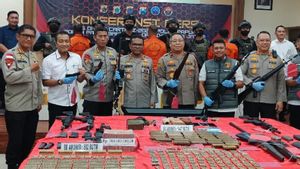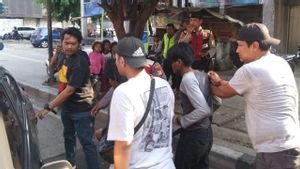YOGYAKARTA - Recently, there have been cases of land disputes in Bandung, West Java, which led to riots. The conflict started with the Muller family claiming land ownership in Dago Elos. To confirm his claim, the Muller family showed Eigendom Verponding's letter as proof of land ownership. So what is eigendom verifying?
The people of Dago Elos Elos Bandung did not accept the claim of land ownership submitted by the Muller family. A number of people held demonstrations together with several paragraphs that caused chaos and clashes with the police on Monday (14/8). They conveyed the alleged forgery of Waris Experts from Dago Elos residents who were in dispute with the Muller family and PT Dago Inti Graha.
The conflict over land struggle in Dago Elos has actually been raging since November 2016. Residents have been living in an area near The Maj Dago luxury apartment, Coblong, Bandung City is threatened with evictions due to land ownership cases. The Muller family submitted a letter from Eigendom Verponding to claim to be the heir on an area of 6.3 hectares.
The term eigendom comes from the word in Dutch which refers to ownership or property. In the legal context, this term often refers to the property of an object or property owned by a certain individual or legal entity.
Eigendom verponding is a legal product proof of land ownership which was first enforced during the reign of the Dutch East Indies. After Indonesia's independence, the framework for the agrarian law of Dutch heritage is maintained as a legal recognition of the ownership of the tahah which is then further regulated in the Agrarian Basic Law (UUPA).
According to the definition in the Law Dictionary published by the Indonesia Legal Center, citing the National Legal Development Agency (BPHN) of the Ministry of Law and Human Rights, "Eigendom" refers to absolute property rights. Meanwhile, "verponding" is defined as permanent property ownership.
Although at this time the eigendom verification law is not relevant, the ownership of the land can still be submitted on the condition that it has a Certificate of Ownership (SHM), Building Use Rights (HGB), Cultivation Rights (HGU), or rights to use.
Because it was formed during the reign of the Dutch East Indies, in 1960, the government provided an opportunity for eigendom verponding owners for 20 years to change the status of land ownership to accordance with Indonesian law. If this step is not taken, the land will automatically belong to the state.
The regulation regarding "Eigendom" itself is contained in Article 570 of the Civil Code (KUH Perdata), but is later revoked by Law no. 5 of 1960 concerning Basic Regulations of Agrarian Principles (UUPA).
In 1960, Law no. 5 of 1960 concerning the Basic Regulations of Agrarian Principles (UUPA) was enacted. This law becomes the main legal basis for land. The second part of Article I paragraph (1) of the UUPA discusses the conversion of rights to "eigendom" land as property rights. However, the UUPA does not provide a specific definition regarding the conversion of land rights.
Such is the review of what is eigendom verponding. Based on Article 32 paragraph (2) PP No. 24 of 1998 concerning Land Registration, eigendom land rights owners can convert according to applicable regulations.
The English, Chinese, Japanese, Arabic, and French versions are automatically generated by the AI. So there may still be inaccuracies in translating, please always see Indonesian as our main language. (system supported by DigitalSiber.id)













